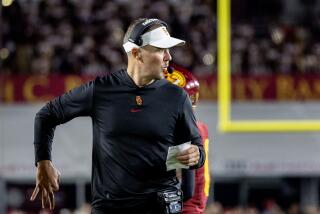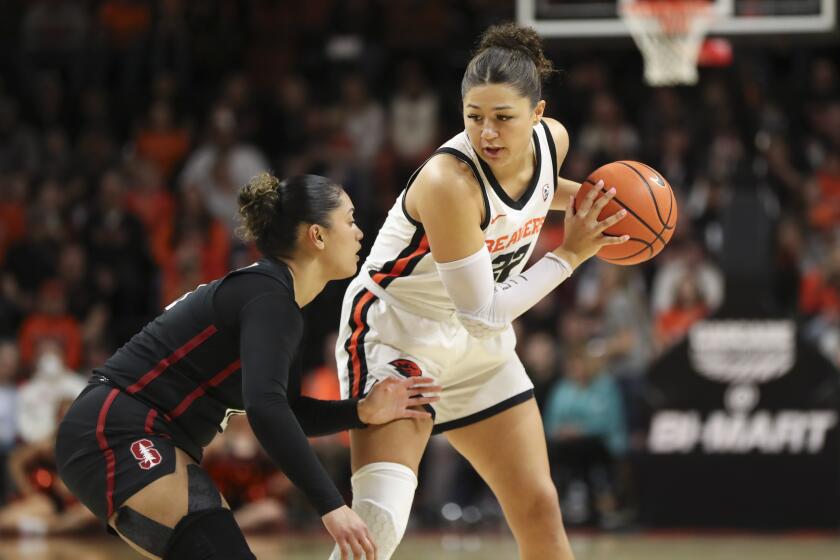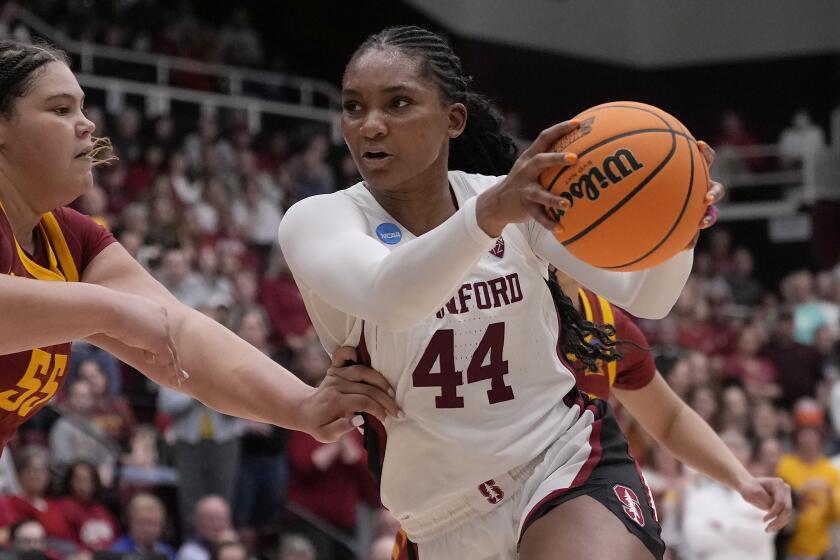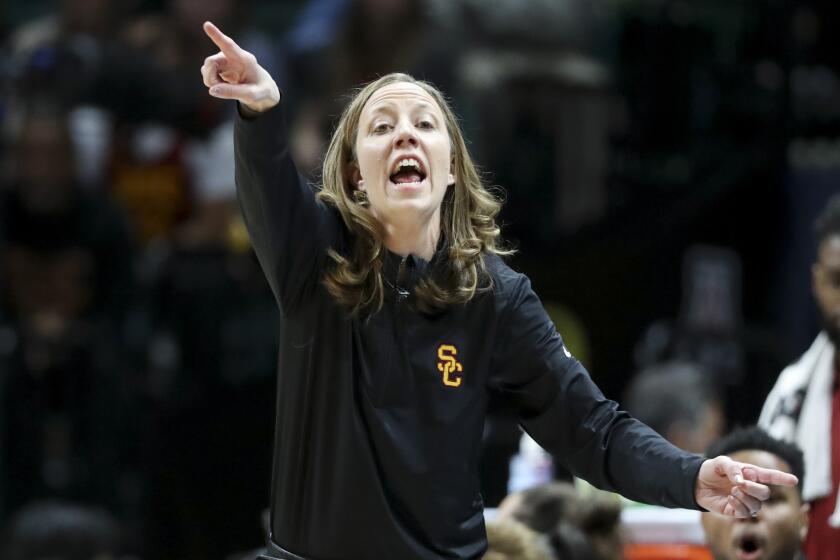Clay Helton’s play-calling to be a change of pace at USC
It won’t be difficult locating Clay Helton on USC’s sideline Thursday night.
When the Trojans play Arizona in the first game since Lane Kiffin’s firing, Helton will be the coach holding a play-call sheet, though not the laminated, jumbo-sized aid Kiffin relied upon.
“I’ll have something,” Helton says. “I don’t think it will be huge.”
Helton, the titled offensive coordinator since the start of the season, finally gets his opportunity to live the part. The Trojans’ quarterbacks coach for three-plus seasons will call plays for the first time since 2009, when he directed an up-tempo offense at Memphis.
USC will not drastically overhaul its pro-style system, but interim Coach Ed Orgeron has charged Helton with infusing the attack and spreading the ball around.
“We’re going to change the pace a little bit and see how Clay likes it,” Orgeron says.
Since last week, Helton, 41, has set the tempo for the offense in practice, moving in and out of the huddle and on the flanks of the line of scrimmage while instructing and encouraging players. More than a few moments cannot pass, it seems, without Helton sprinting, backpedaling or shuffling sideways while chattering “Let’s go! Let’s go! Let’s go!”
“He’s flying around and every position group on offense is fired up,” quarterback Cody Kessler says.
Helton takes up a position about 10 yards behind the offense during scrimmage drills. He places his left hand under his right elbow, his right hand under his chin. But he cannot maintain a contemplative pose for more than a second or two.
“Right there, right there,” he says, pointing while dashing to the line. “I need perfect alignment.”
After a successful run play, Helton sprints upfield through the defense, trailing the ballcarrier.
“You can’t stop Power!” he yells. “You can’t stop Power!”
A few days later, as he welcomes a visitor to his office at the McKay Center, Helton clears blankets from the couch he sleeps on several nights a week.
Helton will spend the next 40 minutes paying homage to the coaches and mentors who helped him achieve his current position, including Kiffin.
But, in the end, he says, “You always put your own personality into it when you get the opportunity.”
Helton’s biggest influence — “my hero” he says — is his father. Kim Helton was an offensive lineman at Florida and then coached there as an assistant before moving on to the University of Miami and stints with four NFL teams. He also was head coach at the University of Houston.
As a boy, Clay played pitch and catch with Miami quarterbacks Jim Kelly and Bernie Kosar and Houston Oilers quarterback Warren Moon. Meanwhile, his father taught him pass protection schemes and other football nuances.
“Once I got into it,” he says of football. “It was an addiction.”
Helton’s parents did not allow him to play organized football until high school. So he was a baseball player until he arrived at Clements High in Sugar Land, Texas.
Helton played quarterback and worked his way into a starting position his senior season. “I was lot better on the chalkboard,” he said, “than I was on the field.”
Helton’s knowledge of the game helped him excel.
“He’d come to the sideline,” says David Sparkman, one of his high school coaches, “and we’d ask, ‘What do you think?’ He’d say, ‘Coach, I think we should do this.’ And he was smart enough to get it done.”
Helton played two seasons at Auburn under Coach Pat Dye, and then transferred to Houston after his father was hired as the head coach before the 1993 season. He was a backup quarterback for two seasons and a committed student working toward a mechanical engineering degree.
When Duke Coach Fred Goldsmith called and offered him a position as a graduate assistant, Helton had to make a choice.
He had already completed enough work for a degree in mathematics and interdisciplinary science. He told his parents he was going to ask his high school sweetheart, Angela, to marry him and would take the position at Duke.
“His mom looked at me like it was my fault,” his father says, laughing.
Jokes Helton: “I think my mom’s still mad at me today that I’m not building buildings.”
In 1995, Helton coached Duke running backs as a 22-year-old graduate assistant. He joined the Blue Devils’ staff full time the next season. His first recruiting trip almost ended before it began because he was too young to rent a car in Florida.
“I’m like, ‘Well, I don’t want to get fired on my first day recruiting so I better get to this kid’s house,’” he says. “I found a cab that drives me about 45 miles… I think the family got a real big kick out of me showing up for the first time in a cab.”
Goldsmith says Helton’s knowledge of the offense went far beyond running backs.
“Of all the guys I ever had, if anybody ever asked who I would pick to be a head coach, it would be him,” Goldsmith says.
Helton moved on to coach with his father at Houston for three seasons, and then joined the staff at Memphis, where he spent 10.
“When you get the opportunity to stay places and settle roots for your wife and kids in this profession, you take that opportunity,” says Helton, a father of three.
At Memphis, Coach Tommy West dispatched offensive coordinator Randy Fichtner and Helton to Clemson to observe and learn a spread system that was being honed by a young offensive coordinator named Rich Rodriguez.
“We fell in love with it,” Helton says.
Memphis adopted the system and went on to earn five bowl invitations during Helton’s tenure. The Tigers ranked 23rd, 26th and 63rd nationally in total offense during Helton’s three seasons as offensive coordinator.
“He’s got some spread in him,” West says.
West was fired near the end of a 2-10 season in 2009 that included a 56-28 loss to Tennessee. After the season, Monte Kiffin, Tennessee’s defensive coordinator at the time, called Helton and asked if he would provide feedback about what he saw defensively when Memphis played the Volunteers.
“We got into a conversation that lasted awhile,” Helton recalls, “and he said, ‘You know, I may call you one day if something ever happens.’”
That December, Helton landed a job at Arkansas State, less than a 90-minute drive from Memphis. While there, his phone rang again. Lane Kiffin had been hired at USC and Monte Kiffin asked if he would be interested in interviewing for a position on the staff. Helton said he would have to complete his duties through national signing day in February but would revisit the idea afterward if they were still interested.
The Kiffins called again after signing day.
“I came out and visited with Coach Kiff and I guess something just clicked,” Helton says.
Now, Helton has replaced Kiffin as the Trojans’ play-caller. He will move from the coaches’ booth to the field so he can interact directly with Orgeron, Kessler, the Trojans’ young tailbacks and also the receiving corps, tight ends and offensive line.
Receivers coach Tee Martin and offensive line assistant James Cregg will be in the booth.
Helton’s play-call sheet does not need to be as large as Kiffin’s, he says, because he is not responsible for as many situations as a head coach.
“You have to have something in front of you,” he says. “You can’t do it all in your mind. I wish I was that good, but I don’t have a photographic memory.”
Like Orgeron, Helton is excited about what amounts to an eight-game audition.
“There’s the competitive side,” he says, “that can’t wait to be able to show what you can do.”
Twitter: @latimesklein
More to Read
Go beyond the scoreboard
Get the latest on L.A.'s teams in the daily Sports Report newsletter.
You may occasionally receive promotional content from the Los Angeles Times.







